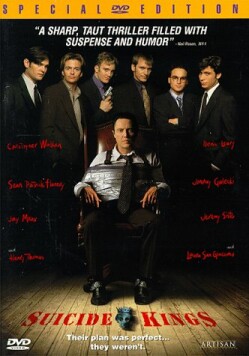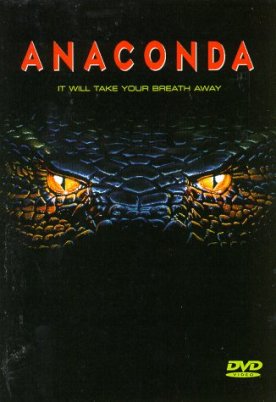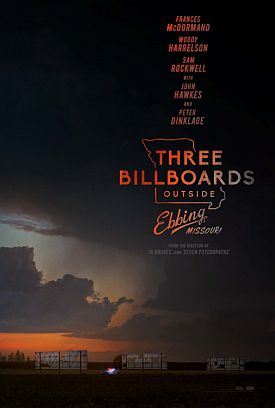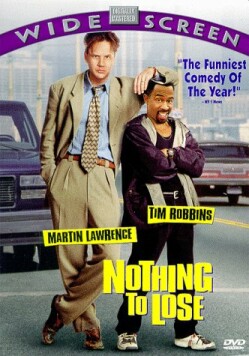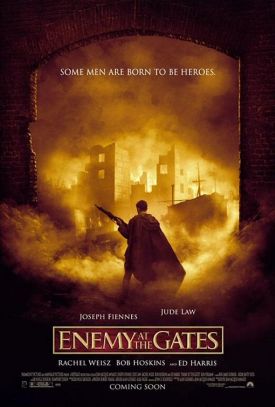Suicide Kings
Suicide Kings directed by Peter O’Fallon attempts without very much
success to present a kidnap caper in the manner of the brothers Coen, featuring a lot of crazy
plot twists, wise-cracking and otherwise fantastical dialogue and lots of comic criminal
incompetence. Christopher Walken plays what has long since become his typecast
part, a sinister criminal boss, Carlo, “Charlie,” Bartolucci, who is kidnapped
by a bunch of young men (played by the young heart-throbs Jay Mohr, Sean Patrick
Flanery, Johnny Galecki and Henry Thomas) who think that he can arrange for the
release of the sister of one of them, who has been kidnapped by yet another
bunch of crooks. The young men have not thought out their actions very
carefully, and Charlie would be amused by the amateurish approach to criminality
of the poor little rich kids (to his lawyer on the telephone he says: “Whatever
you do, don’t send your kid to boarding school”) if they had not cut off one of
his fingers in retaliation for the kidnappers’ apparently having done the same
to the kidnap victim.
Charlie finds out fairly quickly that the kidnapping is an inside job, and
that one or more of his own captors must be involved in it. This creates an
interesting situation in which he is required, while in pain from his severed
finger and craving alcohol, to make some rapid calculations about the young men
as he gets to know them, and about his own chances for survival. They,
meanwhile, when he tells them that there is a rat among them, must decide
whether or not to believe him and, if they do, which one of them has betrayed
the others. It is a promising plot contrivance about which virtually nothing
more can be told without giving away the ending. Suffice it to say that the
ending, when it comes, is rather a let-down and gives us more in the way of
narrative than of moral satisfaction.
The real point to the film is the wise-cracking, much of it by Charlie’s
henchman Lono (Denis Leary), who spends much of the film talking about his new
boots, made from stingray hide, which cost $1500. When his fellow thugs make fun
of him for his “fish shoes” he complains that his only other shoes are his Nikes
and his Bruno Maglis, and “I can’t wear those anymore because of the f******
O.J. thing.” His wife too, he says, is always giving him grief about the boots
and money he has spent on them. He wonders idly about the advisability of
whacking her. “A man can’t spend a little money on his clothes? What’s this
country coming to.” The saga of the stingray boots, however, is not a comic
invention which can bear the weight that is put on it. Nor can we make much
sense of a gratuitous scene in which Lono defends an attractive young woman
against her abusive father with a toaster.
This may be one of the obligatory po mo moments, most of which come as
Charlie talks to the boys about crime in real life and in the movies. His
information about the rat, for instance, is solid, because it comes from “a
place you maybe heard of in the movies. . .Cops lie, newspapers lie. . . the one
thing you can count on: word on the street, that’s solid.” That’s the movies, of
course. The true po mo touch. Likewise, when one of the boys asks Charlie if he
ever gave anybody a dead fish wrapped in newspaper. “You’re getting me mixed up
with somebody from the movies. It must be my classic profile.” But the
impression that such hyperclever irony makes on me is always just to reinforce
the sense I have anyway that the movie has been made for the sake of the
wisecracks. Two of the best come as Lono, horrified by the criminality among the
upper classes, says “It’s that f****** rap s***, isn’t it?” I also liked
Charlie’s lawyer’s telling him:
“I’m a lawyer, remember. I’ve got friends in Hell.” But this is a lot to sit
through for a few good jokes.
Discover more from James Bowman
Subscribe to get the latest posts to your email.

